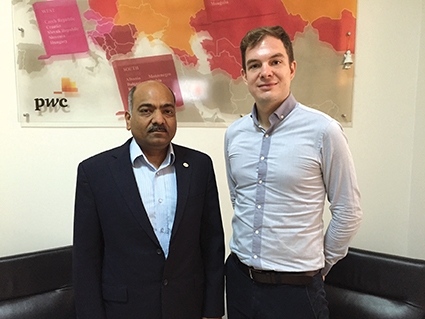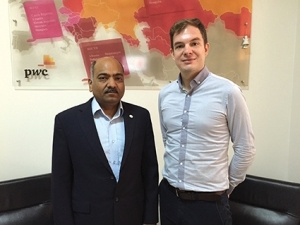PwC on What’s Ahead for Georgia
GEORGIA TODAY got the chance to sit down with Altaf Tapia, Country Managing Partner, PriceWaterhouseCoopers (PwC)Georgia & Armenia, and Simon Parsons, PwC Manager of Tax & Legal Services, to get their take on Georgia, links to the UK and the progress it is making in the lead up to the next election.
PwC offers a global network of skills and expertise in accounting, tax, legal and advisory services and has been in Georgia for 11 years helping both businesses and government organizations to get ahead. “In the last few years, PwC Georgia has had close cooperation with the UK, both in terms of our firm and clients. One example is TBC Bank being listed on the London Stock Exchange- PwC helped with the Initial Public Offering in 2014 and the Premium Listing process this year,” Simon told us.
“Georgia’s success in the 2015 rugby world cup in the UK, and British newspapers calling Qvevri wine the latest trend, means that Georgia is getting more press attention in the UK than ever,” Simon told us. “Our partnering with the British Georgian Chamber of Commerce, which recently opened an office in Tbilisi, having been based solely in London before that, recognizes these growing connections.”
Georgian reform with UK support
Altaf added, “Apart from this, we have more Georgia-UK ties because of the British government’s Good Governance Fund (GGF).” Managed by PwC UK together with PwC Georgia and the Tbilisi consultancy, Policy and Management Consulting Group (PMCG), the British government set up the GGF to provide technical assistance to Georgia and four others (Ukraine, Serbia, Bosnia and Herzegovina and Moldova) so that they become more resilient to political and economic shocks, and have further growth and stability.
Georgia’s public authorities identify priority areas where they would like to strengthen governance capacities - whether by benchmarking performance, improving working processes, increasing transparency or developing new policy and legislation. “This means we’re on the ground to discuss and advise on topics they [the government] want to reform,” Altaf said.
The GGF team then design reform assistance projects, which the British Embassy in Georgia then assesses and approves, before the right people from a range of international experts are chosen to carry out the project.
The Right Mind-Set
Reform is very much on the agenda in Georgia. When looking to other countries in the CIS region, Altaf said he found the Soviet mentality can be “very ingrained” but that in Georgia, “in both politics and the minds of the general public, there is little value still placed on the Soviet regime or styles” and that the “desire to be a part of Europe” is distinctly clear.
As for the development, the assessment was positive. But Altaf suggests further targeted initiatives are needed to prevent brain drain and to up Georgia’s basic vocational training capacities. “Accountants, lawyers and consultants are well catered for [here], but there needs to be more impetus for new graduates to build careers more broadly.”
“Georgia seriously lacks expertise in some key areas,” he said. “The technocrats of Soviet times are no longer around. Now, for example, large companies are finding it hard to get qualified engineers [here].”
He added that more encouragement is necessary in addition to the steps already being taken (such as the focus on STEM in universities, the current PM’s priority project, or the Produce in Georgia program) This should kick start progress soon and should be the beginning.
“A core of expertise needs to be built from schools and colleges. But education and awareness are key- people need to be open to going into new fields and also have the skills to do so.”
“Progress naturally slowed in the 2007-2009 period due to political influence. Further, Georgia is in a political geographical area whereby it can be dependent on the actions of neighboring countries when making its own decisions,” Altaf said, pointing out that over the past four years the pace of development and growth in business confidence has been uneven and the authorities need to continue to try “to get it right”. He expressed hope that the next parliament will provide a stable platform - “to take the country forward faster.”
The EU & Georgia
Altaf thinks that with present times in and around Europe, Georgia is closer but still quite far from being eligible to join the European Union. “The initial expectations given to Georgia were unfortunately high and could have been better managed,” Altaf said
Investors are key to progressing economically, Altaf believes, and links between the UK and the EU and Georgia only serve to boost that side of affairs.
And with the ex-Soviet countries having the tourism and investment potential of Georgia regularly touted at them, now is the “right time to put Georgia and its businesses out there.”
The next step, Altaf added, is to encourage more investment and grow exports.
“Georgian products need to be visible in the EU markets, be tested, tried, and valued for quality. Such access to European markets is vital. It will happen if things progress as they are. It’s just a question of time.”
Altaf Tapia is a qualified Chartered Accountant and a Fellow member of the Institute of Chartered Accountants of India. He has over 30 years of professional practice experience providing Assurance services to a variety of industries including FMCGs, Oil and Gas, Mining, Telecom and Financial services in India, the US, Central Asia and the Caucasus.
Simon Parsons is a Chartered Accountant with the Institute of Chartered Accountants Scotland and Chartered Accountant with the Chartered Institute of Taxation (UK). He has over five years of professional practice experience, advising multinational companies on their tax affairs, previously in the UK, Germany and Singapore.
Katie Ruth Davies











